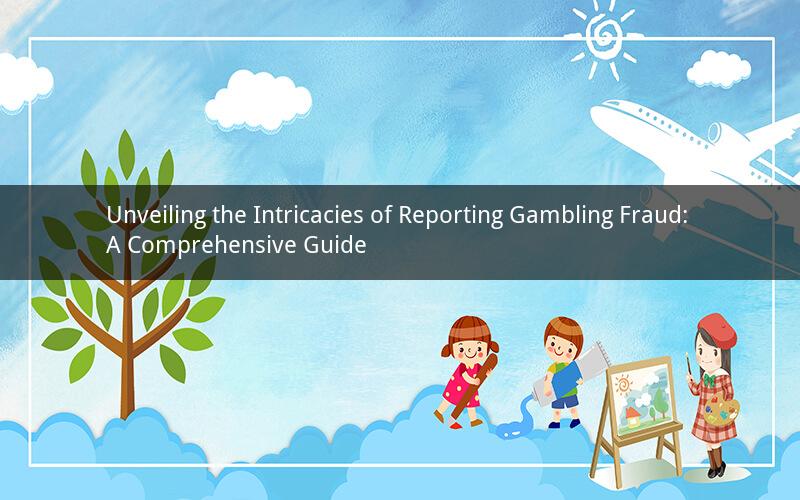
Gambling fraud has become an increasingly significant issue in the rapidly evolving online gambling industry. With the ease of access to online gambling platforms, fraudulent activities have also soared. Reporting gambling fraud is crucial in protecting both the industry and its users. This article delves into the ins and outs of reporting gambling fraud, providing a comprehensive guide for individuals and authorities alike.
Understanding Gambling Fraud
Gambling fraud refers to any fraudulent activity that occurs within the gambling industry. It encompasses various forms, such as fake gambling websites, stolen identities, and fraudulent betting schemes. Identifying and reporting such activities is vital in maintaining the integrity of the industry.
Identifying Gambling Fraud
To effectively report gambling fraud, it is essential to recognize the signs of such activities. Here are some common indicators of gambling fraud:
1. Fake gambling websites: These websites may look legitimate but are designed to steal personal and financial information from unsuspecting users.
2. Stolen identities: Cybercriminals may use stolen identities to open accounts and engage in fraudulent activities.
3. Fraudulent betting schemes: These schemes involve false promises of high returns on investments, leading individuals to lose their hard-earned money.
4. Collusion: Gamblers may collude with each other to manipulate the outcome of a game, resulting in unfair advantages for one party.
The Importance of Reporting Gambling Fraud
Reporting gambling fraud is crucial for several reasons:
1. Protecting users: By reporting fraud, you help protect yourself and others from falling victim to fraudulent activities.
2. Preserving the industry's integrity: Reporting fraud ensures that the gambling industry remains a fair and transparent platform for users.
3. Legal action: Reporting fraud can lead to legal action against the perpetrators, deterring others from engaging in similar activities.
4. Improved regulations: Information gathered from reported fraud cases can help authorities develop better regulations and policies to combat fraud.
How to Report Gambling Fraud
Reporting gambling fraud requires following a specific process. Here's a step-by-step guide to help you navigate the process:
1. Gather evidence: Collect any relevant information or evidence of the fraudulent activity, such as screenshots, emails, or communications with the fraudulent entity.
2. Contact the gambling platform: Inform the gambling platform about the fraudulent activity. They may have their own procedures for handling such cases.
3. Report to authorities: If the gambling platform is unresponsive or unable to assist, report the fraud to the appropriate authorities, such as your local police or a specialized gambling fraud unit.
4. Document the process: Keep a record of all communication and actions taken to report the fraud. This information may be useful for legal or investigative purposes.
5. Follow up: Stay informed about the progress of the investigation and provide any additional information or support required.
Common Challenges in Reporting Gambling Fraud
Reporting gambling fraud can be challenging due to several factors:
1. Lack of awareness: Many individuals are unaware of the signs of gambling fraud, making it difficult to identify and report such activities.
2. Fear of retaliation: Individuals may fear retribution from the perpetrators or the gambling platform for reporting fraud.
3. Complex procedures: The process of reporting fraud can be intricate and time-consuming, deterring some individuals from taking action.
4. Limited resources: Authorities may face resource limitations, making it difficult to investigate and prosecute fraud cases promptly.
5 Questions and Answers on Reporting Gambling Fraud
Q1: What should I do if I suspect I am a victim of gambling fraud?
A1: If you suspect you are a victim of gambling fraud, gather all relevant evidence and report the incident to the gambling platform and the appropriate authorities.
Q2: Can I report gambling fraud anonymously?
A2: While some jurisdictions allow for anonymous reporting, it is advisable to provide your contact information for follow-up and potential legal action.
Q3: What should I do if the gambling platform is unresponsive to my report?
A3: If the gambling platform is unresponsive, report the fraud to the appropriate authorities, such as your local police or a specialized gambling fraud unit.
Q4: Can I report gambling fraud if I am not a victim?
A4: Yes, you can report gambling fraud if you have knowledge of such activities. Your information can help authorities investigate and take action against the perpetrators.
Q5: How long does it take to investigate and resolve a gambling fraud case?
A5: The time it takes to investigate and resolve a gambling fraud case can vary. It is essential to maintain patience and follow up with authorities for updates on the progress of the investigation.
In conclusion, reporting gambling fraud is a crucial step in safeguarding the integrity of the gambling industry. By understanding the signs of fraud, following the appropriate reporting process, and being aware of the challenges involved, individuals and authorities can work together to combat this growing issue. Remember, your actions can make a significant difference in protecting the industry and its users.